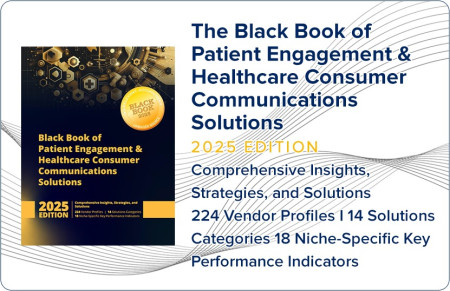Top 5 Digital Strategies Advancing Healthcare Consumer Engagement in 2025 - Insights From Black Book's National Multistakeholder Poll
Survey of 1,672 healthcare providers and 200 healthcare consumers reveals aligned and divergent perspectives on digital tools, engagement barriers, and strategies driving success in 2025

TAMPA, Fla., April 10, 2025 (Newswire.com) - Black Book Research™, healthcare industry's trusted source for unbiased satisfaction polling and technology evaluation, has released findings from its Q1 2025 national study on IT tools for patient engagement and communication. This comprehensive survey not only assesses the effectiveness of digital tools available to healthcare providers but also explores how these technologies can significantly enhance healthcare consumer satisfaction and interactions.
The survey, which gathered insights from 1,672 healthcare professionals across over five hundred U.S. provider organizations, highlights five leading strategies that are delivering measurable benefits in advancing healthcare consumer engagement. By examining the digital actions taken by providers, the report also sheds light on the additional challenges faced from the consumer perspective, emphasizing the need for innovative solutions to improve engagement.
Key Findings from the Survey
1.AI-Powered Personalization of Patient Communications
Providers are increasingly leveraging artificial intelligence to foster personalized and efficient communication with patients. A remarkable 84% of respondents reported that AI-enabled outreach tools-ranging from automated appointment reminders to dynamic care gap messaging-have directly enhanced patient satisfaction while reducing manual workloads.
2. Omnichannel Communication as a Standard
The expectation for communication through multiple, patient-preferred channels-such as text messaging, mobile apps, email, and secure portals-has become a standard practice. Nearly 77% of surveyed organizations noted that allowing patients to choose their preferred interaction method significantly improved care plan adherence, facilitating continuous and accessible engagement.
3. Predictive Analytics for Proactive Outreach
The survey underscored the importance of data-driven targeting to transition from reactive to proactive care. Over 70% of respondents utilizing predictive engagement platforms reported a measurable reduction in preventable emergency department visits. By anticipating patient needs and risks, organizations are not only improving outcomes but also optimizing resource allocation.
4. Interoperability as a Catalyst for Connected Experiences
While data fragmentation has historically hindered holistic engagement, the landscape is shifting. In 2025, only 32% of participants identified interoperability as a major barrier-down from 82% two years prior. This improvement reflects enhanced integration among EHRs, CRMs, engagement platforms, and patient communication tools, which are essential for creating cohesive digital experiences across care settings.
5. Cybersecurity and Data Privacy as Drivers of Digital Trust
The role of cybersecurity in maintaining patient confidence in digital services cannot be overstated. A significant 79% of respondents indicated that patient participation in digital engagement programs increased when organizations demonstrated robust data protection practices. Digital trust, particularly concerning sensitive health data, has become a critical factor influencing patient adoption of mobile tools and virtual interactions.
A Comprehensive Perspective on Patient and Healthcare Consumer Engagement: The 2025 Black Book survey incorporated insights from a diverse range of stakeholders, including:
Provider Organizations: Clinicians, administrators, IT, marketing, and access leaders.
Health IT Vendor Clients: Users actively engaged with engagement tools.
Healthcare Consumers: 200 individuals with direct patient experience in the past 12 months.
While the core rankings and performance data were primarily based on provider responses, Black Book conducted separate, non-sponsored panels to capture healthcare consumer perspectives. This approach provided a holistic understanding of the disconnects, successes, and priorities in digital engagement strategies.
Notably, healthcare consumers identified five underrecognized barriers to engagement, including discomfort in clinical settings and frustration with impersonal digital tools. Providers and IT leaders also shared insights on implementation challenges, perceived ROI, and emerging best practices.
Five Consumer-Identified Barriers to Patient Engagement and Provider Responses
Emotional Discomfort and Modesty in Clinical Settings
Consumer Insight: 42% of consumers reported avoiding appointments due to discomfort with exams or discussing sensitive topics.
Provider Response: Normalize modesty concerns through trauma-informed care, gender choice in providers, and pre-visit communication.
Digital Remedy: Implement pre-visit questionnaires, telehealth options, and educational videos to build comfort and reduce anxiety.
Lack of Continuity in Provider Relationships
Consumer Insight: 37% disengaged due to provider turnover and lack of relational continuity.
Provider Response: Prioritize relationship-based care, communicate transitions, and maintain personalization.
Digital Remedy: Utilize longitudinal care plans, AI-based continuity tools, and automated messaging with a consistent tone.
Perception That Digital Tools Serve the System, Not the Patient
Consumer Insight: 31% felt that apps and portals were designed more for provider workflows than patient needs.
Provider Response: Involve patients in design decisions and focus on usability and value.
Digital Remedy: Adopt mobile-first, consumer-oriented tools with real-time personalization and conversational interfaces.
Lingering Mistrust from Previous Negative Encounters
Consumer Insight: 29% indicated that a single bad clinical experience led to long-term disengagement.
Provider Response: Emphasize empathy, communication, and visible responsiveness to feedback.
Digital Remedy: Implement post-visit sentiment surveys, emotion detection tools, and anonymous reporting mechanisms.
Unclear Value in Preventive Engagement
Consumer Insight: 35% admitted they ignored outreach that didn't feel personalized or timely.
Provider Response: Contextualize outreach and align it with relevant life or health events.
Digital Remedy: Leverage predictive analytics, behavior-based triggers, and personalized multimedia messaging.
About the Black Book Survey
The 2025 Black Book Healthcare Consumer Engagement & Communications Technology Survey was independently conducted from Q4 2024 through Q1 2025. The survey included three respondent groups: healthcare providers, IT users of engagement platforms, and a separate panel of healthcare consumers. All participation was voluntary, and no vendors were permitted to sponsor or influence any part of the polling or reporting process. This study underscores the critical role of technology in enhancing patient engagement and satisfaction, paving the way for a more connected and responsive healthcare system.
Register now to receive a complimentary PDF of the 130 page report upon confirmation of your eligibility. The report offers gratis to healthcare industry stakeholders-including hospitals, health systems, payers, physician groups, insurers, technology providers, and healthcare leaders. https://blackbookmarketresearch.com/2025-black-book-of-patient-engagement-and-healthcare-consumer-communications-technology
Source: Black Book Research
